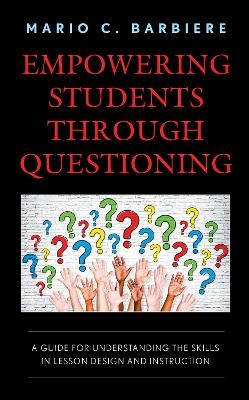
Empowering Students Through Questioning
A Guide for Understanding the Skills in Lesson Design and Instruction
Seiten
2022
Rowman & Littlefield (Verlag)
978-1-4758-6447-2 (ISBN)
Rowman & Littlefield (Verlag)
978-1-4758-6447-2 (ISBN)
Empowering Students Through Questioning examines the art of question construction so teachers can plan more effective lessons and achieve greater student engagement. Addressed is the purpose of questioning, pitfalls in developing questions, types of questions to use for assessments, and activities to use to determine question effectiveness.
Teachers ask 40 questions a day. Do the questions empower students, assess student knowledge of the subject matter, or promote student metacognition? Empowering Students Through Questioning: A Guide for Understanding the Skills in Lesson Design and Instruction addresses the art and skill of questioning so teachers can plan more effective lessons and achieve greater student engagement and cognition. Included are practice activities for teachers to use in planning questions for their lesson, as well as field tested rubrics to help coach and mentor teachers in understanding how their questions address student activity. The book also discusses common pitfalls of questioning, what type of test is best to use to assess student knowledge, activities for planning and assessing questioning, types of assessments to use, and the types of questions that are most effective for the specific assessment. The relationship between Revised Bloom’s Taxonomy (teacher input) and Webb’s Depth of Knowledge (student output) is also shown so teachers can see the impact of their questioning.
Teachers ask 40 questions a day. Do the questions empower students, assess student knowledge of the subject matter, or promote student metacognition? Empowering Students Through Questioning: A Guide for Understanding the Skills in Lesson Design and Instruction addresses the art and skill of questioning so teachers can plan more effective lessons and achieve greater student engagement and cognition. Included are practice activities for teachers to use in planning questions for their lesson, as well as field tested rubrics to help coach and mentor teachers in understanding how their questions address student activity. The book also discusses common pitfalls of questioning, what type of test is best to use to assess student knowledge, activities for planning and assessing questioning, types of assessments to use, and the types of questions that are most effective for the specific assessment. The relationship between Revised Bloom’s Taxonomy (teacher input) and Webb’s Depth of Knowledge (student output) is also shown so teachers can see the impact of their questioning.
A passionate practitioner with a strong theoretical background, Dr. Mario C. Barbiere was a teacher, school administrator, superintendent, professor, and school turnaround educator committed to positive student academic success and closing the achievement gap. He has worked at both the district and state level for school turnaround promoting student self-regulation and teacher empowerment.
Preface
Acknowledgments
Introduction
Chapter 1.Background: The Nature of the Learner
Chapter 2.Questioning Pitfalls
Chapter 3.Instructional Release
Chapter 4.Effective Questioning
Chapter 5.Questioning Activities
Chapter 6.Planning Questions
Chapter 7. Putting It All Together
About the Author
| Erscheinungsdatum | 02.09.2021 |
|---|---|
| Verlagsort | Lanham, MD |
| Sprache | englisch |
| Maße | 155 x 219 mm |
| Gewicht | 209 g |
| Themenwelt | Geisteswissenschaften ► Psychologie ► Pädagogische Psychologie |
| Sozialwissenschaften ► Pädagogik | |
| ISBN-10 | 1-4758-6447-7 / 1475864477 |
| ISBN-13 | 978-1-4758-6447-2 / 9781475864472 |
| Zustand | Neuware |
| Haben Sie eine Frage zum Produkt? |
Mehr entdecken
aus dem Bereich
aus dem Bereich
Grundlagen, Diagnostik und Förderung
Buch | Softcover (2023)
Kohlhammer (Verlag)
29,00 €
Buch | Softcover (2024)
Springer (Verlag)
24,99 €
Buch | Softcover (2024)
Springer (Verlag)
24,99 €


